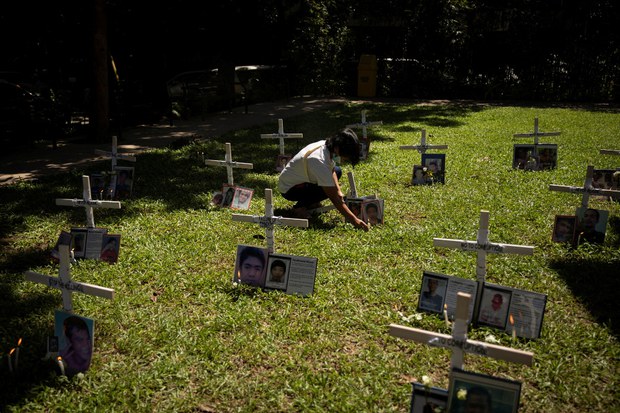Watchdog group urges UN to scrutinize Philippine drug-related killings under Marcos
2022.09.12
Manila
 A Filipina lights a candle at a memorial at the Commission on Human Rights in Quezon City, Metro Manila, where families of drug-war victims gathered to pray ahead of All Saints’ Day, Oct. 29, 2021.
A Filipina lights a candle at a memorial at the Commission on Human Rights in Quezon City, Metro Manila, where families of drug-war victims gathered to pray ahead of All Saints’ Day, Oct. 29, 2021.
An international human rights group is calling on the United Nations to scrutinize the Philippines for officer-involved killings under the new government as part of the nation’s war on drugs.
Such killings are taking place since the Marcos administration succeeded the Duterte administration in late June, Human Rights Watch said on Tuesday. During his six years in power, former President Rodrigo Duterte drew scrutiny from at home and abroad for his bloody crackdown on narcotics, including from the U.N. human rights chief and the world body’s International Criminal Court.
“U.N. member-states should not be fooled by the baseless claims from the new Philippine government that the rights situation has suddenly improved,” said Lucy McKernan, HRW’s director in Geneva.
“Continued U.N. scrutiny of the Philippines is vitally important because ‘drug war’ killings are still common and police impunity for rights violations remains the norm,” she said.
Since President Ferdinand Marcos Jr. took office on June 30, 72 drug-related shootings by police have occurred in the Philippines, New York-based HRW said, citing Dahas, a program of the Third World Studies Center of the University of the Philippines that tracks media-reported drug deaths.
Marcos’ office did not immediately respond to a BenarNews request for comment on the statement from Human Rights Watch.
In 2021, an internal investigation by the justice department found that in many cases, police officers could be prosecuted for such killings because they did not follow protocol.
At least 8,663 Filipinos were killed after Duterte took office in mid-2016, Human Rights Watch said, citing information from the Office of the U.N. High Commissioner for Human Rights (OHCHR).
Karapatan, a local human rights alliance, said that figure could be under reported. Rights groups had previously said the numbers could be about three times higher.
“While the Philippine government may paint a different picture, we believe that the human rights situation remains dire,” Karapatan secretary general Cristina Palabay told BenarNews.
“There are no indications on any substantial change in the situation nor on the policies being implemented by the government that addresses pressing concerns on human rights, justice and accountability issues.”
Marcos has promised to carry on Duterte’s drug war but “within the rule of law.” Duterte is the father of Marcos’ vice-presidential running mate, Sara Duterte.
On Monday, the national police chief said the force would not change its strategy to fight back if drug suspects attacked its officers.
“Definitely they have to defend themselves, but we will not instigate [incidents],” Gen. Rodolfo Azurin Jr. told reporters.
During his years as president, Duterte often told police officers to shoot suspects if they believed their lives were in danger.
The Philippine National Police’s strategy would be different under the new administration, Azurin said.
Asked if there would be more arrests and fewer deaths, he said: “I think we have been doing that.”
Universal Periodic Review
In November, the U.N.’s Human Rights Council in Geneva is scheduled to hold its Universal Periodic Review where it will assess the Philippines’ human rights record. The last review occurred in 2017, barely a year into Duterte’s term.
Meanwhile, the Marcos administration last week officially asked the International Criminal Court in The Hague to not resume its investigation into the Duterte administration’s drug war.
The country’s Office of the Solicitor General, in a letter via the Philippine Embassy to the Netherlands, said the ICC had “no jurisdiction over the situation in the Philippines.”
The Philippines officially left the ICC in 2019, a year after Duterte withdrew the country from the Rome Statute, the international treaty which created the tribunal.
Marcos has refused calls from civil society groups for the Philippines to rejoin the ICC, saying Manila could conduct its own investigations.







